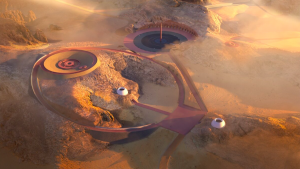Comic books have always been considered somewhat unwelcoming to women. Unless clad in skin-tight latex or cast as the damsel in distress, they’re often disregarded – merely serving as tools to advance the story of the leading man. The usual sexist undertones that permeate much of the culture are being opposed by an increasingly visible female readership who are demanding to see themselves reflected in the medium they love. For the creators of the comic series Bitch Planet, the merging of feminism and comics has always seemed a most natural fit.
Described by co-creator Kelly Sue DeConnick as being “born of a deep and abiding love for exploitation [genre] and women in prison movies of the 60’s and 70’s”, Bitch Planet takes place on an off-planet prison known as the Auxiliary Compliance Outpost. Focussing on a handful of women who have been imprisoned there for the absurd misconduct of ‘non-compliance’, Bitch Planet becomes home to ‘criminals’ whose offences range from murder to disobeying their husbands.
Published by Image Comics, the first issue introduces the reader to Bitch Planet’s protagonists: Marian, Penny, Kamau, Meiko, and Violet. Richly illustrated by Valentine DeLandro, they are all women imprisoned for not doing what men expect of them. Their narrative arcs move back and forth throughout the series, alternating between how the women came to be arrested and the-day-to-day happenings at the Outpost, where they spend much of their time avoiding the wrath of the omnipresent and sinister-sounding Council of Fathers.
Even while the odds are stacked against our heroes, they refuse to conform or bend to the will of their oppressors. DeConnick and DeLandro extended this resoluteness to the visuals of the characters, as well as their story arcs. The women come from all walks of life and represent a host of body types and races. They aren't all sexy and quirky; they are convoluted, contradictory beings whose flaws are relatable and human.
In a conversation with the Wall Street Journal, DeConnick – known for her controversial re-imagining of Captain Marvel – admits that she’s always been aware of comic-book publisher’s reluctance to focus on female superheroes, who often cite fears that their male readership wouldn’t be able to relate for their foot-dragging. “But girls have always read comics,” she counters. “There’s nothing intrinsically masculine about telling stories with pictures.”
What DeConnick and De Landro have created is a science-fiction dystopia that comments forcefully upon humanity’s host of shortcomings - specifically its treatment of women. Marian, Penny, Kamau, Meiko, and Violet are complicated, complex symbols of how their creators perceive women to be devalued in modern society.
A childhood lover of exploitation films, revisiting the genre as an adult blew DeConnick away. What had once seemed so progressive, read as the complete opposite through her adult eyes. Bitch Planet -recently an inaugural winner of the Virginia Library Association's Graphic Novel Diversity Award - is her reclamation of a genre that has consistently refused to love its woman fans back. “Every time I am willing to step out on that ledge a little bit is a time my daughter maybe doesn’t have to,” she says.
Watch DeConnick's talk below where she shares her "Five Steps to Becoming a Professional Discomfort Provider".







